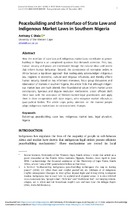| dc.description.abstract | How the interface of state law and indigenous market laws contributes to peacebuilding in Nigeria is an unexplored question that demands attention. First, law,
human security and peace are interrelated through the cultural ideas and norms
that inform human behaviour. Second, the co-existence of normative orders in
Africa favours a top-down approach that inadequately acknowledges indigenous
law, neglects its economic, cultural and religious influences, and thereby affects
human security. Based on key informant interviews, focus group discussions and
observation of markets in southern Nigeria, this article finds that although indigenous market laws are much altered, their foundational values inform market union
constitutions, bye-laws and dispute resolution mechanisms. Union officials draft
these laws with the assistance of Western-trained legal practitioners and apply
them in close co-operation with state organs, who recognize market tribunals as
quasi-judicial bodies. The article urges policy attention on the manner people
adapt indigenous market laws to socio-economic changes. | en_US |

